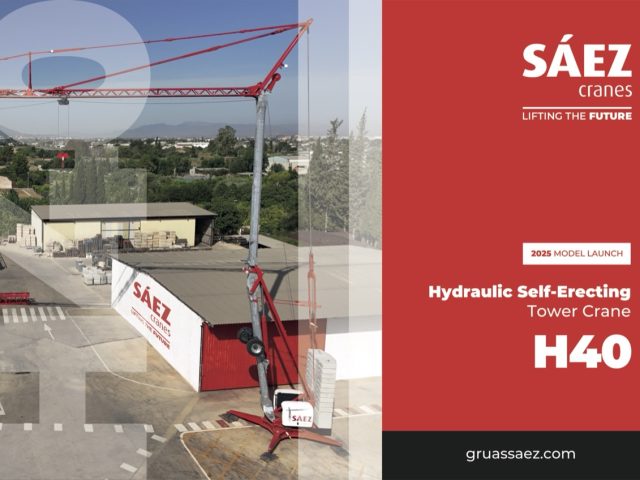A nimble trio of Potain self-erecting cranes — an Igo T 99, an Igo T 85 A, and a Hup 40-30 — is expediting a commercial framing project in booming Salt Lake City.
Adopting cutting-edge lifting equipment is the first step in transforming how a construction job is completed. The second step is having a methodical hoist plan. In Salt Lake City, three Potain self-erecting tower cranes — an Igo T 99, an Igo T 85 A, and a Hup 40-30 — are following this formula to efficiently frame a 260,000-square-foot, mixed-use complex and cut months off the build schedule.
“These Potain self-erecting cranes pack a punch,” said Heather Talenah, project manager for Jacobsen Construction Company, the general contractor for the project. “They have a tiny footprint and do not require excessive logistics or staging. Combined with their reach and lifting capacity, we can strategically place them around the job to be out of the way while improving precision and productivity.”

Talenah has over 30 years of experience selecting cranes for projects ranging from hospitals and schools to five-story-plus housing projects. She approaches each job with the same proactive planning mindset.
“When this project hit my desk, I instantly realized that self-erecting towers were going to be advantageous for us. This building consists of retail, garage, residential, hotel, and condos plus we are building roads and future pad sites that are all coming online at the same time. These different influences and schedule pressures drove the decision for a hoisting plan that gives us three hooks working to cover more of the job site and build faster,” she said.
The plan called for three self-erecting cranes, which were supplied to framing subcontractor Zitting Construction by local Potain dealer Bronson Crane.
The Hup 40-30 has a maximum capacity of 4.4 USt and a maximum radius of 131 ft. The Igo T 85 A has a variable height telescoping lattice mast of 66 to 75 ft — with the option to add three mast inserts for an additional horizontal jib hook height of up to 125 ft — and has a maximum capacity of 6.6 USt.
Potain’s newest self-erecting crane, the Igo T 99, offers a greater reach of 157 ft, a 6.6-USt maximum capacity, and a height under the hook in the horizontal jib position of up to 126 ft. It also offers versatility on job sites with tight constraints, and Zitting is the first company to use the Igo T 99 in North America.
Increased efficiency
Framing subcontractor Zitting Construction shifted its mindset about lifting equipment after being introduced to Potain self-erecting cranes.
“Typically, we’re contracted to frame 8,000 to 10,000 sq ft of wood in a week, which is about 15 semi truckloads,” said Zitting Superintendent Jonathan Hammon. “If you had told me that back in the 1990s, I would have laughed at you because it wouldn’t have been possible. But, with these Potain self-erecting cranes, it’s easy.”
Zitting estimates that with the self-erecting cranes factored into the build plan, they can finish framing in six to seven months, over 50% faster than using alternative methods to move material. A Potain self-erecting crane’s 90-degree up-and-over reach allows it to be placed closer to the structure and cover a wider work area compared to a mobile crane. For example, at a 150-foot radius, the Igo T 99 can capably lift 2,600 lbs, which allows the crew to pick and set prefabricated wall panels into place directly from the truck. It also doesn’t require a poured foundation, as with a traditional tower crane.
The cranes’ remote-control operation adds to the efficiency factor by eliminating blind picks. The crane operator is now located in the area where the lift is happening, increasing communication and productivity among workers.
“On this project, I have three hooks swinging and that gives me the opportunity to support multiple flows of activities,” Talenah explained. “There aren’t any unknowns because every step was worked out in the logistics planning. We sat down and developed the swings and the heights and where the overlap occurs, and systems to coordinate.”
A reliable, silent partner

Judd Wagstaff, owner and general manager of Bronson Crane, said that companies like Jacobsen and Zitting are ahead of the curve in adopting self-erectors. “I am very proud to see projects like this where general contractors are effectively using self-erecting tower cranes. When they are not used, I know the extra work the labourers are doing and the operational benefits they’re missing. Having equipment like the Igo T 99 and T 85 keeps companies on the cutting edge of technology, so they can deliver a high-quality finished product in an efficient manner.”
The cranes can be hardwired into a site power source and are near-silent while operating, making them good neighbours in locations with noise restrictions. “I can now work past ten at night or before seven in the morning. On a critical project where the schedule is key, and I’ve got to have those hours available, I have a hoisting option that fits that bill, backed by a trusted dealer,” Talenah said.

Technicians from Bronson Crane handled the setup for all three cranes and are on standby for service and parts when needed, although Talenah cited Potain’s historic superior reliability. For example, on a memorable 2004 project, a Potain crane operated 24/7 for seven-and-a-half months without a single breakdown or a shutdown.
“It’s really important to make the right choice and have faith and confidence in your partner that’s going to be with you every step of the way from day one to the end of the project,” Talenah concluded. “That swinging hook is the heartbeat of the project to keep the work flowing, whether it’s concrete, whether its forms, whether it’s lumber, or whether it’s parts, it keeping the production moving.”


















